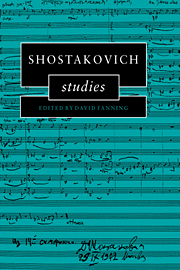Book contents
- Frontmatter
- Contents
- Acknowledgments
- 1 Introduction. Talking about eggs: musicology and Shostakovich
- 2 Public lies and unspeakable truth interpreting Shostakovich's Fifth Symphony
- 3 Form in Shostakovich's instrumental works
- 4 Russian theorists on modality in Shostakovich's music
- 5 The cycle of structure and the cycle of meaning: the Piano Trio in E minor, Op. 67
- 6 Leitmotif in Lady Macbeth
- 7 From Lady Macbeth to Katerina Shostakovich's versions and revisions
- 8 The Golden Age: the true story of the première
- 9 ‘And art made tongue-tied by authority’ Shostakovich's song-cycles
- 10 A debt repaid? Some observations on Shostakovich and his late-period recognition of Britten
- 11 Shostakovich and Schnittke: the erosion of symphonic syntax
- Index
11 - Shostakovich and Schnittke: the erosion of symphonic syntax
Published online by Cambridge University Press: 22 October 2009
- Frontmatter
- Contents
- Acknowledgments
- 1 Introduction. Talking about eggs: musicology and Shostakovich
- 2 Public lies and unspeakable truth interpreting Shostakovich's Fifth Symphony
- 3 Form in Shostakovich's instrumental works
- 4 Russian theorists on modality in Shostakovich's music
- 5 The cycle of structure and the cycle of meaning: the Piano Trio in E minor, Op. 67
- 6 Leitmotif in Lady Macbeth
- 7 From Lady Macbeth to Katerina Shostakovich's versions and revisions
- 8 The Golden Age: the true story of the première
- 9 ‘And art made tongue-tied by authority’ Shostakovich's song-cycles
- 10 A debt repaid? Some observations on Shostakovich and his late-period recognition of Britten
- 11 Shostakovich and Schnittke: the erosion of symphonic syntax
- Index
Summary
In 1976 a collection of articles devoted to Shostakovich appeared in Moscow. It had been prepared during the composer's lifetime but was not published until after his death. How often in those days was a collection of this sort full of ‘official’ eulogies of no use to anybody; but in this case there were just a couple of short articles which stood out from the common run – their authors were Boris Tishchenko, a pupil and friend of Shostakovich, and Alfred Schnittke, a composer who was destined to become the real spiritual successor of Shostakovich's music.
At that time Schnittke wrote in his short, two-page article:
It is now fifty years that music has been under the influence of Shostakovich. … In the twentieth century only Stravinsky was endowed with this same magic ability to subordinate everything coming into his field of vision to himself. … The Eighth and Fourteenth Quartets and the Fifteenth Symphony are the most original landmarks in time, where the past enters into new relations with the present, invades musical reality, like the ghost of Hamlet's father, and reshapes it. When in Shostakovich the images of his own musical past meet up in collages with images from the history of music an astonishing effect of objectivisation occurs, of introducing the individual to the universal, and it is in this way that the greatest task in the life of an artist is solved: to influence the world through confluence with the world [vliyaniye na tnir cherez sliyaniye s mirom].
- Type
- Chapter
- Information
- Shostakovich Studies , pp. 254 - 270Publisher: Cambridge University PressPrint publication year: 1995
- 3
- Cited by



